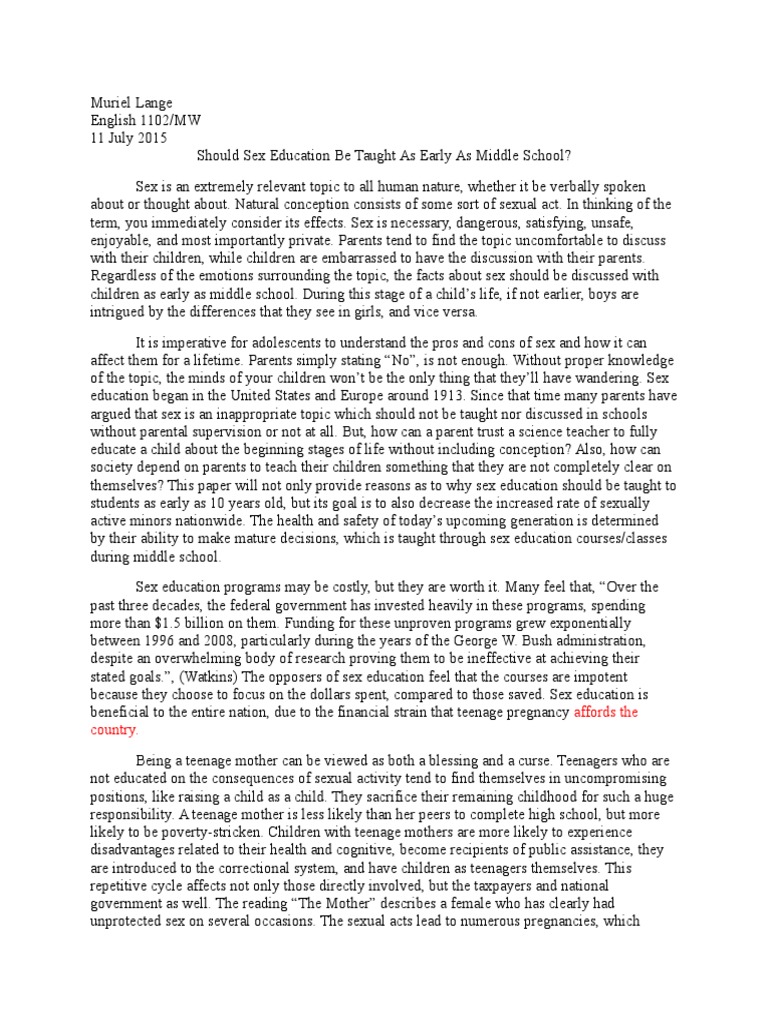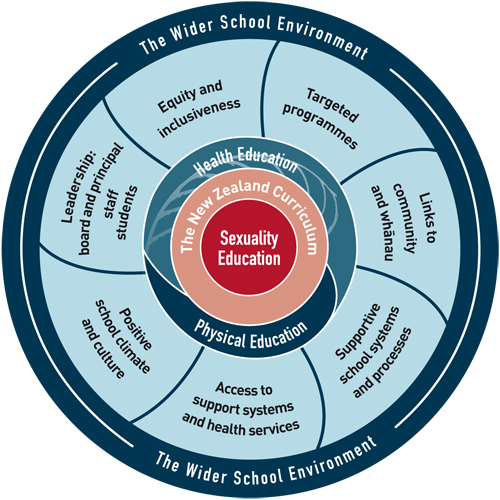
The NIH Research Education Program (R25) supports research education activities in the mission areas of the NIH. The overarching goal of this R25 program is to support educational activities that encourage individuals from diverse backgrounds, including those from groups underrepresented in the biomedical and behavioral sciences, to pursue further studies or careers in research The contents of the National Center on Safe Supportive Learning Environments Web site were assembled under contracts from the U.S. Department of Education, Office of Safe and Supportive Schools to the American Institutes for Research (AIR), Contract Number A (Bailey, ) In fact, examination of the socialization of gender within schools and evidence of a gender biased hidden curriculum demonstrates that girls are shortchanged in the classroom. Furthermore, there is significant research indicating steps that can be taken to minimize or eliminate the gender bias currently present in our education
Environment | National Center on Safe Supportive Learning Environments (NCSSLE)
A school environment is broadly research papers on sex education in schools by research papers on sex education in schools facilities, classrooms, school-based health supports, and disciplinary policies and practices. It sets the stage for the external factors that affect students. A positive school environment is defined as a school having appropriate facilities, well-managed classrooms, available school-based health supports, and a clear, fair disciplinary policy.
There are many hallmarks of the academic, disciplinary, and physical environments of schools with a positive climate. Supportive school environments have a meaningful influence on student outcomes.
An extensive amount of research has linked a positive school environment to higher test scores, graduation rates, and attendance rates. For example, effective and highly qualified teachers with high expectations for students and good teaching conditions have been linked to strong academic performance in multiple studies.
Peer support for achievement-oriented behaviors, such as studying or participating in class, research papers on sex education in schools, is also strongly tied to positive school climate and academic achievement.
In general, for students to achieve academic success they must attend and be engaged in school, and school environment can influence both attendance and engagement. School discipline policies that emphasize relational or restorative, as opposed to punitive, justice and are considered clear, fair, and consistently enforced by students are related to higher student attendance rates and levels of engagement.
Relational responses to negative behavior are sensitive, individualized, and emphasize character strengths as a means of preventing future misbehavior, a common practice within schools with positive climate. Conversely, studies show that indicators of poor school environment are strongly linked to poor test scores, low graduation rates, low attendance rates, and student disengagement.
Indicators of poor school environment include low levels of teacher satisfaction, high rates of teacher turnover, low academic expectations, and a messy or unsafe physical plant. Furthermore, a strong link exists between exclusionary policies—suspension, expulsion, and forced transfers—and high school dropout. In the school year, the latest date for which nationally representative information is available, students were suspended from school for 5 days or moretimes. This translates to at least 19 million hours of missed school and instructional time.
Battistich, V. American Journal of Public Health, 87— Boccanfuso, B. Multiple responses, promising results: Evidence-based, nonpunitive alternatives to zero tolerance. Washington, DC: Child Trends. Bryk, A. Organizing schools for improvement: Lessons from Chicago : University of Chicago Press. Chang, L. Child Development, 74 2 Christle, C. School characteristics related to high school dropout rates. Remedial and Special Education, 28 6 Cohen, J.
School climate: Research, policy, teacher education and practice. Davis, J. The effects of school context, structure, and experiences on African American males in middle and high school, research papers on sex education in schools. Journal of Negro Education, 63 Eccles, J. Ames Eds. New York: Academic Press, research papers on sex education in schools. Fenzel, M. Educating at-risk urban African American children: The effects of school climate on motivation and academic achievement.
Paper presented at the annual meeting of the American Educational Research Association. Fuligni, A. The academic achievement of adolescents from immigrant families: The role of family background, attitudes, and behavior.
Child Development, 68 2 Goddard, R. Academic Emphasis of Urban Elementary Schools and Student Achievement in Reading and Mathematics: A Multilevel Analysis. Educational Administration Quarterly, 36 5 Gottfredson, G. What schools do to prevent problem behavior and promote safe environments.
Journal of Educational and Psychological Consultation, 12 4 Grayson, J. School climate factors relating to teacher burnout: A mediator model. Teaching and Teacher Education, 24 5 Hallinger, P. School context, principal leadership, and student reading achievement.
Elementary School Journal, 96 5 Hardre, P. A motivational model of rural students' intentions to persist in, versus drop out of, high school. Journal of Educational Psychology, research papers on sex education in schools 2 Hoy, W. Middle school climate: An empirical assessment of organizational health and student achievement. Educational Administration Quarterly, 33 3 Hughes, J. Adverse School Context Moderates the Outcomes of Selective Interventions for Aggressive Children.
Journal of Consulting and Clinical Psychology, 73 4 Kendziora, K. Student connection research: Final narrative report to the Spencer Foundation. Washington, DC: American Institutes for Research. Klem, A. Relationships matter: Linking teacher support to student engagement and achievement. Journal of School Health, 74 Lee, V. Social support, academic press, and student achievement: A view from the middle grades in Chicago : Consortium on Chicago School Research.
A multilevel model of the social distribution of high school achievement. Sociology of Education, 62 Social support, academic press, and student achievement: A view from the middle grades in Chicago.
Chicago: Consortium on Chicago School Research. Ma, X. The Development of Science Achievement in Middle and High School: Individual Differences and School Effects.
Evaluation Review, 26 4 MacNeil, A. The effects of school culture and climate on student achievement. International Journal of Leadership in Education, 12 1 McNeely, C.
Promoting student connectedness to school: Evidence from the National Longitudinal Study of Adolescent Health. Journal of School Health, 72 4 Mayer, G. Antisocial behavior: Its causes and prevention within our schools. Education and Treatment of Children, 24 Nelson, J. Maximizing student learning: The effects of comprehensive school-based program for preventing problem behaviors. Journal of Emotional and Behavioral Disorders, 10 Osher, D.
How we can improve school discipline. Educational Researcher, 39 1 Issues of cultural and linguistic competency and disproportionate representation. Rutherford, M.
Mather Eds. New York: Guilford Press. Safe, supportive, and effective schools. Furlong Eds.
Why we shouldn’t shy away from sexual education - Dr. V. Chandra-Mouli - TEDxChisinau
, time: 16:50Master of Social Work Clinical Research Papers | School of Social Work | St. Catherine University

The U.S. Federal Bureau of Investigation (FBI) began monitoring Martin Luther King, Jr., in December , during his involvement with the Montgomery bus boycott, and engaged in covert operations against him throughout the s. FBI director J. Edgar Hoover was personally hostile toward King, believing that the civil rights leader was influenced by Communists Research on single-sex education is also complicated by the legal requirement that assignment to single-sex classes must be completely voluntary. Bigler adds, however, that as public single-sex schools increasingly begin to offer admission based on a lottery system, opportunities for more effective studies on the topic should emerge Carson et al., ed., Eyes on the Prize, Kennedy, “President Kennedy’s Radio-TV Address on Civil Rights,” Congressional Quarterly (14 June ): – King, “In a Word—Now,” New York Times Magazine, 29 September King, “A Look to ,” New York Amsterdam News, 4 January King, Statement on the passage of the Civil Rights Act of , 19 June , MLKJP-GAMK
No comments:
Post a Comment